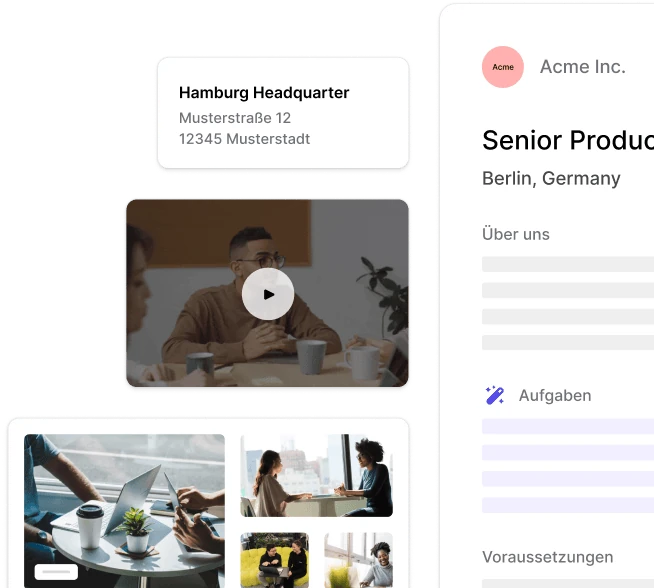Hard skills vs soft skills: which are more important?
Hard skills have been at the forefront of hiring for as long as most recruiters or hiring managers can remember. However, times may be changing.
Table of contents
Hard skills have been at the forefront of hiring for as long as most recruiters or hiring managers can remember. However, times may be changing.
While hard skills are undoubtedly important in a certain section of roles, such as GDPR Compliance Officers, does this mean that you should be neglecting a candidate’s soft skills?
We’ll detail this below.
What is the difference between soft skills and hard skills?
The first step in deciding whether hard skills vs soft skills are more important in your hiring process is to understand the difference between the two skill types. Together, these skill types form a well-rounded skill set.
Hard skills
Hard skills are essentially a candidate’s skills that can be measurable and proved by a performance certificate, training, or a workshop. Aside from basics like reading and writing, they’re often directly related to a role.
For example, these could be graphic design, coding, or culinary skills. For more information on the ins and outs of hard skills, check out our hard skills glossary article.
Soft skills
Soft skills are less easily measurable and include a range of coping skills, behavioural aspects, and people skills. These can be learned both through experience and in some cases, such as with management styles, through training. Find out more about soft skills in our soft skills glossary article.
So, soft skills versus hard skills: which are more important when hiring?
This is an ongoing question amongst hiring managers and those involved in recruitment. Certainly, it would be unwise to hire an Architect who has no experience in designing architecture. Therefore, a certain level of hard skills will be necessary for most positions.
However, if you have a senior team member leading a project, with a complete lack of communication or leadership skills, the chances are that both the team and the leader will struggle.
For less senior roles, whether entry-level or mid-level, a different set of soft skills become more essential.
At these levels, learning and development will shape the employee’s career, rather than leadership and management. These earlier career stages will define how well candidates can develop their hard skills. They will develop horizontally (through learning new skills on the same level) and vertically (through deepening the understanding of their current skills). This stage will also be when they begin to learn management skills.
Additionally, communication, feedback, and teamwork skills are essential to team improvement. Having a team that constantly communicates with each other, shares knowledge and teaches each other how to do things better will lead to a better product or service.
As Bill Gates once said during a TedTalk:
“We all need people who will give us feedback. That’s how we improve.”
Therefore, for these roles, it is important to assess these skills in a candidate especially closely.

Why are hard skills important?
Hard skills are undeniably useful in a lot of cases. Having a chef who knows how to follow food safety procedures, as well as operate your kitchen equipment, will mean they can join your business and help maintain a good standard.
It also means that onboarding a new hire costs you a lot less in terms of time and money, which are both extremely finite resources. Having a new employee come in and already know the ropes means they can start contributing to the workload immediately!
Why are soft skills important?
Soft skills are important for different reasons than hard skills.
While an employee doesn’t always technically need to be able to form a relationship with their colleagues, the same way they need to be able to code or design, it certainly helps. Having soft skills, such as communication and adaptability, make the difference between a good team and a great team.
Soft skills mean that a team can be more proactive, solve problems without higher management and prioritise tasks more effectively. Other added benefits to a candidate with soft skills include the ability to learn new hard skills and to motivate themselves to grow. This type of candidate will constantly improve themselves and bring new knowledge and processes to the company.
Soft skills vs hard skills in company culture
Another point to consider is your company culture.
In a fast-paced office where tasks are constantly changing and collaboration is key to success, soft skills such as communication and prioritisation are undoubtedly more important than in a slower-paced remote working environment. These are the skills that will help keep a candidate engaged and motivated.
And, if you’re a company that values perfection and keeps social events and collaboration to a minimum, then hard skills will almost certainly be valued more. Although, it is worth noting that building company culture can play a huge role in motivation and quality of work in the long run.
The best of soft skills and hard skills
Evidently, the best candidates will have an excellent mix of both soft and hard skills. That’s why it’s important to look for a balance.
While it may be tempting to hire the employee with the most certifications or highest level of coding ability, first it may be best to assess their teamwork ability. This can help to indicate how well they will fit into your team and whether they’ll be able to share their knowledge and easily learn new skills.
This type of hiring approach helps to future proof a team and allows you to hire an employee who is a good cultural fit and investment into the business.
How to assess hard skills vs soft skills
So, you now know soft and hard skills are often equally important. But, how do you look for these skills in potential hires or those considered for a promotion?
Due to their measurable nature, hard skills are much easier to test for. This can be done in the following ways, among others:
• Work sample
• Assessment tests, such as those provided by LinkedIn
• Providing certifications or qualifications
• Trial shifts or work trials
Soft skills, however, are more difficult to test for. This doesn’t mean that it is impossible though! Soft skills can be tested in the following ways:
• Certifications or qualifications in relevant areas
• Strategic interview questions
• Trial shifts or work trials
• Internally, by observing performance or speaking to other employees
Changing your process
With this new information in mind, it might be time to reassess your current hiring criteria or process. If this is the case, our how to hire an employee article can help you.
Remember, this is a process that should be constantly evolving and changing as your company grows and changes its needs.
Amber Denwood
Amber Denwood was a Content Manager at JOIN. She mostly wrote about employer branding, trying to help companies to understand how they can improve their image.


